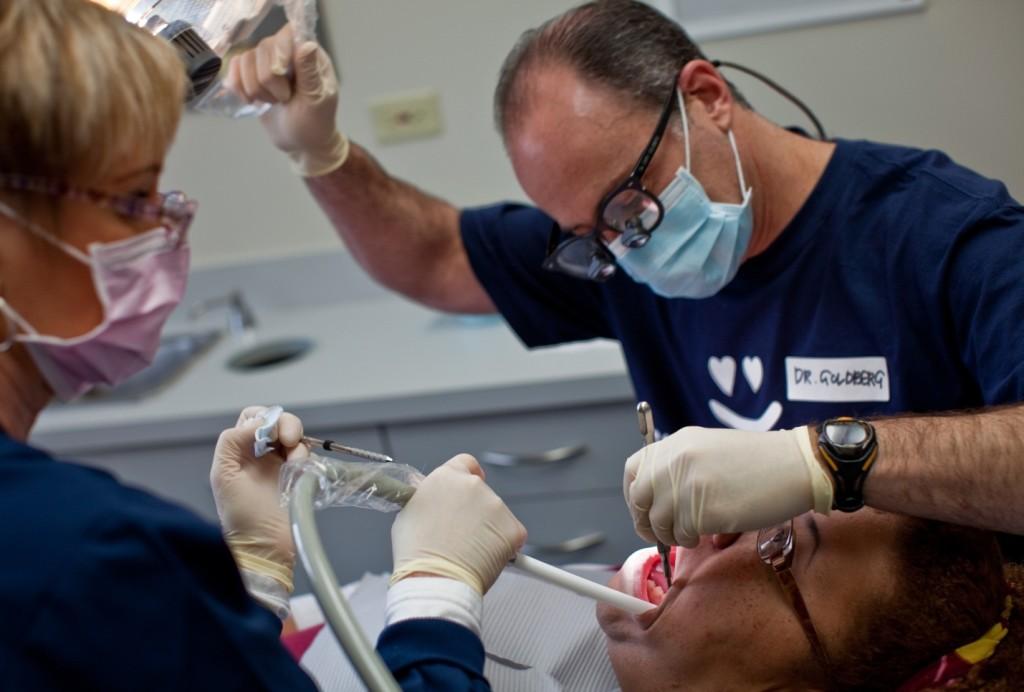Gain wisdom about wisdom teeth
Photo courtesy of http://www.mctcampus.com/. Dr. Cary Goldberg and assistant Vonnie Poppell extract wisdom teeth from a patient at the Center for Dental Excellence in Flossmoor, Illinois.
November 15, 2013
Imagine sitting in the chair in the dentist’s office, lying under a bright light, the dentist poking around in your mouth with a tiny mirror. He consults your file for a moment before telling you, “We’re going to have to get those wisdom teeth removed.”
What are wisdom teeth? Contrary to its name, there is no real “wisdom” involved. They are the third and final set of molars that most people get in their late teens or early twenties. Some people don’t need to have them removed, but others aren’t so lucky.
“If the teeth are erupted (through the gum tissue) we use leverage forces to loosen the teeth and remove them. Teeth are connected to the bone with a ligament and this space is used to loosen the tooth. If they are under the gum tissue (Tissue Impaction), a small incision is made and the tooth is delivered in total and sutures are not always required. If the tooth is under the gum and the bone (Bony Impaction), a larger tissue incision is made, followed by a small window cut into the bone and then the tooth is sectioned and removed in small pieces. By taking out the tooth in small pieces, the surgical wound is much smaller and healing faster,” says Dr. Rick Rogers, local dentist who has plenty of experience with removing wisdom teeth.
According to Rogers, he determines if a patient must have the wisdom teeth removed based on the amount of available space he/she has in his/her mouth. If wisdom teeth are left in when they should be removed, pain and infection will occur.
“I was 16 years old [when I got my wisdom teeth removed],” says junior Sarah King. “I had to get them out because they hurt my mouth and were moving my [other] teeth.” King was nervous leading up to the procedure because she was scared that she wouldn’t wake up from the anesthesia.
While most may be a little anxious like King when informed that they require the surgery, there are some teens like Natalie Rupinski, junior, who aren’t phased by the news.
“My top [wisdom teeth] wouldn’t fit in my mouth,” Rupinski explains. “The bottom ones were fine, but we took them out anyway.”
Prior to the surgery, both King and Rupinski got plenty of rest. King doesn’t recall eating much, and Rupinski was sure to take plenty of pain medication to avoid any discomfort she may have had. It took about a week or two for them to recover.
“After my surgery, I lived on the couch for four days,” says King. “All I did was sleep.”
Rogers says this is the best thing a patient can do. “We recommend one day of rest and the following day to have an easy schedule with no strenuous activity,” he says. “Because there is little or no discomfort, many patients ignore these instructions which then leads to poor healing and discomfort.”
Some people don’t have to go through this process in their lifetime because they are born without wisdom teeth altogether. Hannah Laughter, sophomore, is one of them.
“I found out about two years ago at the dentist,” Laughter says. “He told me that I wouldn’t have to worry about getting them removed because my body just never made any.”
How Stuff Works explores why, before modern humans, people didn’t need surgery. In ancient man, his mouth was bigger, and the third molar might have replaced other teeth that were worn down from chewing roots, leaves, and raw meat. With evolution (one theory), man came to depend less on those third molars. The brain got bigger. The mouth got smaller.
Age is definitely a contributing factor when determining if a patient needs to have his/her wisdom teeth extracted.
“When my mom was in her mid-20’s, she had to get her wisdom teeth removed because she didn’t when she was younger. She recommends getting them removed before they become fully grown because she had a miserable experience as an adult,” Laughter says.
People like Laughter’s mother learned a little too late. Rogers says, “We don’t like to extract impacted wisdom teeth after the age of 30 as our healing ability begins to decrease as we age… It would have been much easier, with better healing and less discomfort, if they had done it as suggested when they were younger.”
If you’re expected to have your wisdom teeth removed in the future, Rupinski and King advise that you stay calm.
“Don’t be afraid,” Rupinski says. “It’s really not a big deal.”






